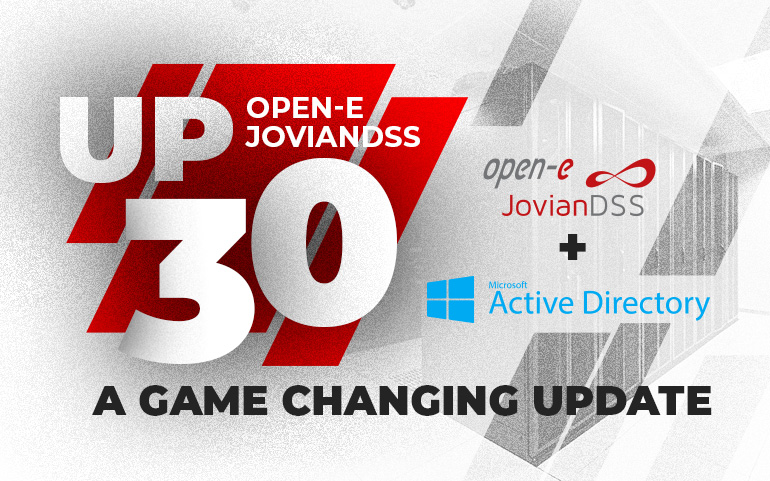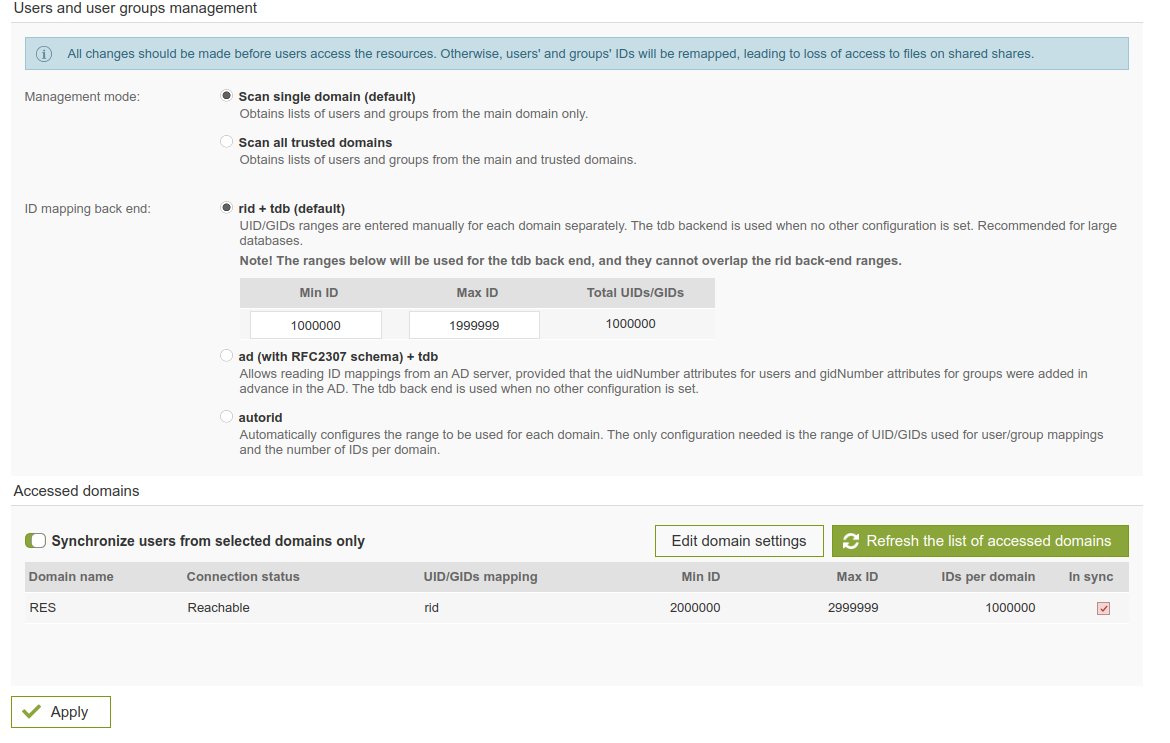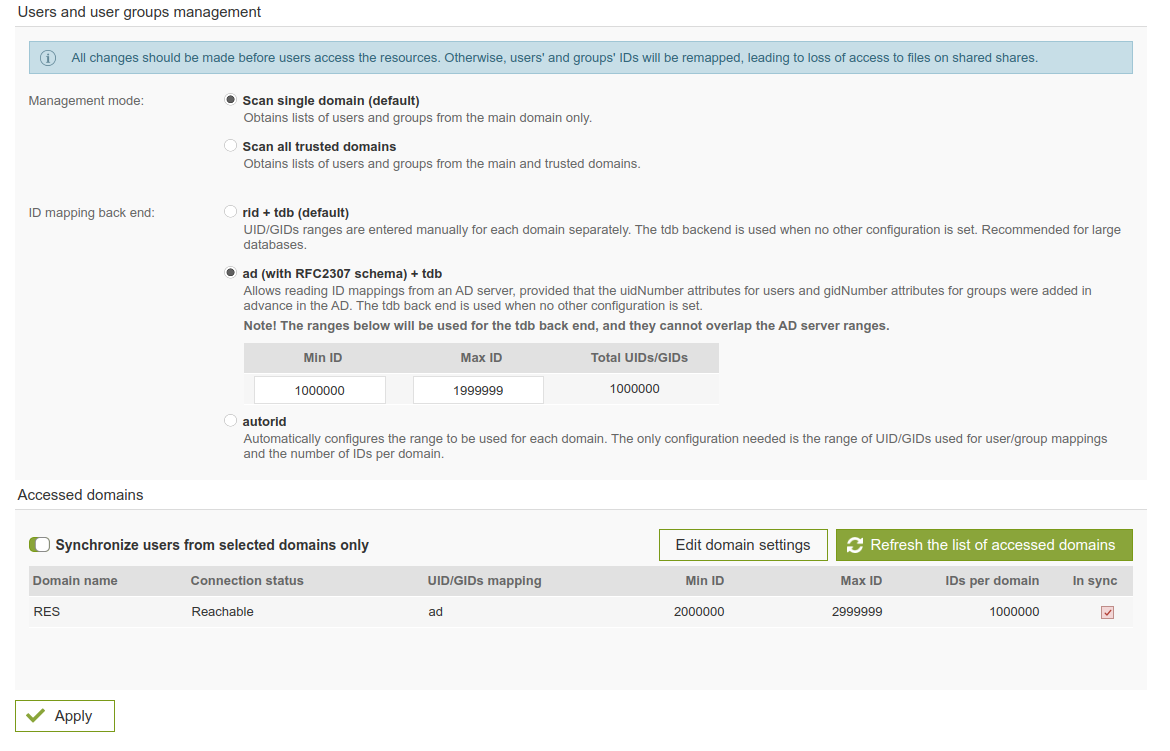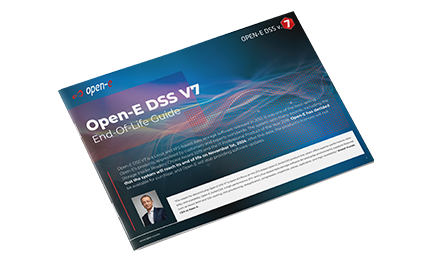Open-E JovianDSS Up30 - a Game Changing Update
We are delighted to let you know that the new Open-E JovianDSS Up30 version is…
Read More
In the latest update of Open-E JovianDSS – the Up30, we added several features that significantly simplify and streamline the management of data storage infrastructure. In our opinion, the most important of these is the addition of support for ZFS Special Devices and the ability to partition NVMe drives under caching mechanisms. It means less hardware usage and expenses and streamlines the operation of your company’s entire data storage system. It also simplifies data storage system architecture, management, and maintenance. However, even more advantages come with the features and upgrades available with Up30.
The introduction of two features related to Active Directory is also crucial for our customers:
So, let’s delve deeper into these Active Directory functions available in Open-E JovianDSS Up30 to see how their application benefits your data storage infrastructure.
Before the recent update, there was only one method of assigning a User ID (UID) or Group ID (GID) to a specific user or group — autorid. The autorid mechanism is primarily designed to simplify ID management within a single-domain environment. Its main benefits are:
However, when the autorid is used across multiple domains in complex setups involving trusts or multiple Active Directory forests, several issues (such as ID consistency, cross-domain trusts, and limited exclusion) may occur.
This is why in Open-E JovianDSS, we advise users against using autorid in the most complex data storage architecture, such as clusters with multiple domains.
In such cases, issues related to user identification and automatic access grants may arise. Other configurations (single-node with multiple domains, single-node with a single domain, and a cluster with a single domain) are compatible with the autorid function used via Open-E JovianDSS.
To allow our users to allocate UIDs and GIDs ranges across multiple domains or to use them with cluster configurations, we have applied Active Directory support with RID range and Active Directory support for RFC2037.
RID works within Open-E JovianDSS to facilitate efficient management and allocation of SID for users and groups across multiple domains. It empowers administrators to define domain-specific RID ranges.
Its most important features are:
By allowing users to assign RID ranges, Open-E JovianDSS offers flexibility and customization in managing SID generation across multiple domains. It enables administrators to optimize SID allocation based on each domain’s specific needs and characteristics. Thanks to the users’ ability to define these IDs, they can meticulously control and maintain the consistency of the ID mapping.

RFC2307 establishes a standardized schema for representing Unix users and groups within Active Directory. By supporting RFC2307, Active Directory can consistently store Unix-specific attributes such as UID and GID. It enables seamless integration with Unix-based systems. Once the RFC2307 option, which relies on Active Directory for user authentication and access control, is selected in the Open-E JovianDSS GUI, the user benefits from its compatibility. This interoperability improves user access management, allowing organizations to leverage existing Active Directory infrastructure for both Windows and Unix environments, which is the most recommended setting by Open-E.

As you can see, Open-E JovianDSS Up30 features significantly improve the base product. However, the advancements mentioned in this article – ZFS Special Devices, NVMe Partitioning, and Active Directory-related features – are not the only ones our latest update provides. Stay tuned for future articles in which we will highlight the rest of them to show how much your business and data storage infrastructure benefit from using our Open-E JovianDSS and its news update.
We strongly advise customers who use our legacy data storage system, Open-E DSS V7, to switch to Open-E JovianDSS. Open-E DSS V7 will reach its end of life on November 1st, 2024. Until then, customers will still be able to use their existing licenses and support contracts until they expire but not extend them. System updates will not be provided, either.
If you’re considering migrating from Open-E DSS V7 to Open-E JovianDSS, reach out to your Open-E Sales Representative for a tailored special offer. This offer encompasses:
Read our dedicated brochure to learn more about the transition process from Open-E DSS V7 to Open-E JovianDSS on preferential terms.

Leave a Reply